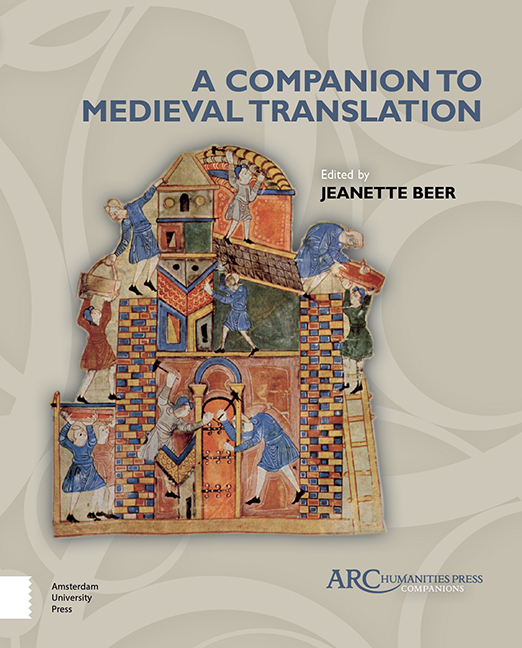Book contents
- Frontmatter
- Contents
- Acknowledgements
- Introduction
- Chapter 1 The European Psalms in Translation
- Chapter 2 The Old French Bible
- Chapter 3 Middle English Religious Translation
- Chapter 4 Bible Translation and Controversy in Late Medieval England
- Chapter 5 Medieval Convent Drama: Translating Scripture and Transforming the Liturgy
- Chapter 6 Translating Romance in Medieval Norway: Marie de France and Strengleikar
- Chapter 7 Christine de Pizan, Translator and Translation Critic
- Chapter 8 Translation, Authority, and the Valorization of the Vernacular
- Chapter 9 Vernacular Translation in Medieval Italy: volgarizzamento
- Chapter 10 Dante and Translation
- Chapter 11 Chaucer and Translation
- Chapter 12 Alchemy and Translation
- Chapter 13 Scientific Translation: A Modern Editor’s Perspectiv
- Chapter 14 Modern Theoretical Approaches to Medieval Translation
- Chapter 15 Observations on Translation by a Thirteenth-Century Maître: Li Fet des Romains
- Epilogue. Observations on Translation by the Oxford Professor of Poetry: Pearl
- General Bibliography
- Appendix
- Index
Chapter 10 - Dante and Translation
Published online by Cambridge University Press: 20 November 2020
- Frontmatter
- Contents
- Acknowledgements
- Introduction
- Chapter 1 The European Psalms in Translation
- Chapter 2 The Old French Bible
- Chapter 3 Middle English Religious Translation
- Chapter 4 Bible Translation and Controversy in Late Medieval England
- Chapter 5 Medieval Convent Drama: Translating Scripture and Transforming the Liturgy
- Chapter 6 Translating Romance in Medieval Norway: Marie de France and Strengleikar
- Chapter 7 Christine de Pizan, Translator and Translation Critic
- Chapter 8 Translation, Authority, and the Valorization of the Vernacular
- Chapter 9 Vernacular Translation in Medieval Italy: volgarizzamento
- Chapter 10 Dante and Translation
- Chapter 11 Chaucer and Translation
- Chapter 12 Alchemy and Translation
- Chapter 13 Scientific Translation: A Modern Editor’s Perspectiv
- Chapter 14 Modern Theoretical Approaches to Medieval Translation
- Chapter 15 Observations on Translation by a Thirteenth-Century Maître: Li Fet des Romains
- Epilogue. Observations on Translation by the Oxford Professor of Poetry: Pearl
- General Bibliography
- Appendix
- Index
Summary
Although Dante is not renowned primarily as a translator, translation forms a large and important part of his work. From his treatise, De vulgari eloquentia, it is evident that, for his work as a translator, he was conversant in or could read at least four languages— Italian, Latin, Occitan, and Old French. Dante employs the verb tra(n)slatare only twice in the Commedia, both in Paradiso and in its strict etymological sense of movement from one place to another: David's transferral of the Ark of the Covenant from town to town: “Colui … / fu il cantor de lo Spirito Santo, / che l’arca traslatò di villa in villa” (He … / was the one who sang the praises of the Holy Ghost / and brought the ark from town to town) and the passage of the Pilgrim and Beatrice from one celestial heaven to another: “vidimi translato / sol con mia donna in più alta salute” (I saw myself translated, alone now with my lady, / to a more exalted state of bliss). In the Convivio, however, Dante uses derivatives from translatare in the modern sense of “translation”— translatori and translazione— in reference to translations of Aristotle and to an apparently contradictory statement concerning the composition of the galaxy in the Stagirite's works, an obvious error which Dante attributes to the “translators” and not to the author: “E credo che fosse lo errore de li translatori” (I believe that this is due to an error on the part of the translators). Earlier in the Convivio he uses another verb, “transmutare,” in various forms when speaking about the impossibility of rendering poetry into another language: “E però sappia ciascuno che nulla cosa per legame musaico armonizzata si può de la sua loquela in altra transmutare sanza rompere tutta sua dolcezza e armonia” (Therefore everyone should know that nothing harmonized according to the rules of poetry can be translated from its native tongue into another without destroying all its sweetness and harmony).
Dante continues by noting that this is the reason why Homer's poetry (unlike Greek works in prose) was not translated into Latin, and why the Psalms lack the sweetness of music and harmony precisely because they were translated— “furono transmutati”— from Hebrew into Greek and then from Greek into Latin: “E questa è la cagione per che Omero non si mutò di greco in latino come l’altre scritture che avemo da loro.
- Type
- Chapter
- Information
- Companion to Medieval Translation , pp. 125 - 132Publisher: Amsterdam University PressPrint publication year: 2019



